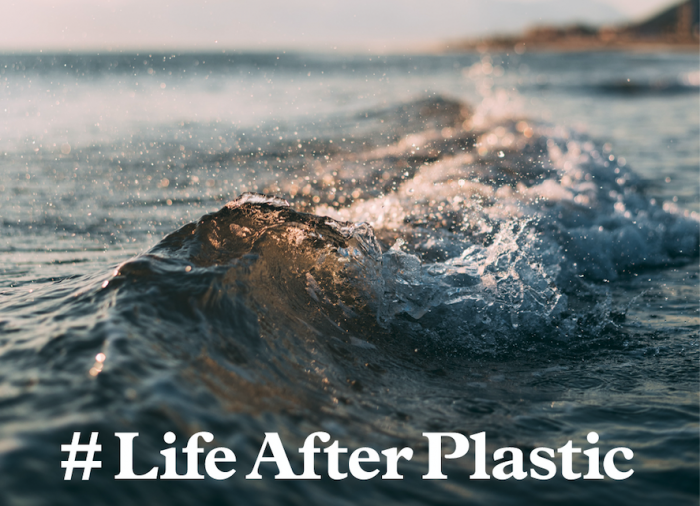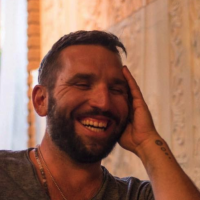Do you remember when the very first blue recycling bin showed up at your house?
I do.
It was the ’80s.
My family gathered around it, reading the instructions together. It was like magic; it was as if we received absolution for that niggling feeling we had whenever one of us threw a plastic orange juice jug into the trash.
With the arrival of that blue bin, gone was the undeniable instinct that it literally went against nature to throw plastic away. The guilt, lifted. Suddenly it became okay to consume things in single-use packaging because we weren’t really throwing it away.
We were “recycling” it.
Or so we thought.
Later in life I realized the blue bin was a lie. Sure, some of the things we put into it got recycled. Certain kinds of paper. Glass bottles. Aluminum cans. Possibly, perhaps, maybe some of the plastic. But not everything. Not even most of it.
My blue bin revelation was, as Al Gore coined, a deeply inconvenient truth. It brought me back to the beginning. That uncomfortable feeling returned whenever I reached for a plastic produce bag. There was a pit in my stomach when I got to the bottom of the hand soap container.
Real talk: only 7% of all plastic gets recycled. And even that 7% doesn’t truly get recycled; it gets downcycled. (Downcycling involves breaking plastic down into its component elements. Once these materials are recovered, they are reused if possible, but usually as a lower-value product. This is expensive and has its own environmental repercussions)
By the time I discovered this bad news bomb, it was the early aughts, and I was an adult. The good news was that I had agency over what I bought. I voted with my dollar. I was an anti-plastic advocate, a member of the bamboo-fork-carrying club.
If I could only get a smoothie in a plastic cup, I went without. If it came wrapped in plastic packaging, I passed. My farmer’s market bags were canvas. My car was bio-diesel. I opted for glass whenever possible.
I was leading by example.
Then a type of amnesia took over. Using a certain amount of plastic was inevitable in the packaging of the skincare line I founded, and I loosened my personal code around buying products in plastic. It wasn’t as if I forgot everything I knew about the lie of the blue bin. As my life got busier and more complex, I made exceptions here and there.
I bargained with my conscience until my own blue bin was filled with a pile of denial.
I’ll admit it’s a weird time to think about recycling. Within the span of a month, grocery shopping has taken on the vibe of an extreme sport. Real life survival fears have been triggered by a set of rapidly changing global circumstances.
Questions we’ve never had to face before, like “Will my local natural food store have what I need/want?,” and “How long will the line be to get in?” can elicit ancestral traumas of famines and plagues that are now embedded in our DNA.
Right now you’re probably not giving a second thought to the plastic clamshell your arugula comes in. Or where your shampoo bottle goes once its empty.
That’s completely understandable.
There will be a time, however, when this will all be over. We will remove our masks, and toilet paper and baker’s yeast will return to the store shelves.
We will think of things in terms of pre- and post-pandemic.
And that plastic clamshell that held your arugula and the bottle that held your shampoo will probably still end up in the ocean along with 8 million metric tons of other plastics destined to make their way into the ocean this year.
Would I have chosen to begin reshaping my company, the body and skincare industry, and the future of our planet during a pandemic? No, I wouldn’t.
Yet here we are. Because I know in my heart that this can’t wait.
My company, Alpine Provisions, plans to deliver all our organic, plant-based, high-efficacy products to you plastic-free in an effort to create a #LifeAfterPlastic.
We will replace plastic with aluminum, which can be recycled almost infinitely. And because it’s so lightweight, shipping aluminum saves millions of pounds of carbon emissions per year.
We will also use paper and paperboard, both of which are easily and routinely recycled. Of all packaging materials, paper is the most compostable. Plus, the American forest products industry typically plants five trees for every one harvested.
One thing I know is that we’re going to get through this current global situation, and once we do, we will have a rare opportunity to start again by doing things differently. We will have the chance to live in greater alignment with our values.
For many this is a crisis to survive. For many this is an opportunity to serve. I’m using my good fortune to claim the latter, and asking you to join me in envisioning a #LifeAfterPlastic. Let the lie of the blue bin become a truth by filling it with things that can actually be recycled.
To get Alpine Provisions, and get involved, please check out our #LifeAfterPlastic Kickstarter campaign.
Waylon talks with Joshua Onysko, founder of Alpine Provisions.









Read 2 comments and reply